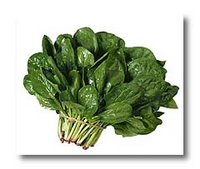 Hopefully, we all have fresh produce gracing the drawers of our fridges, but some of us may be a little wary given the whole spinach situation. I found the following article, which I thought was well written and very informative. I'm going to keep buying, cooking and eating fresh produce (perhaps not spinach for a while) because I know that it is very healthy and it's a huge part of the economy here in Central California. Are you worried? Have your stopped buying lettuce, fruit, or other fresh produce?
Hopefully, we all have fresh produce gracing the drawers of our fridges, but some of us may be a little wary given the whole spinach situation. I found the following article, which I thought was well written and very informative. I'm going to keep buying, cooking and eating fresh produce (perhaps not spinach for a while) because I know that it is very healthy and it's a huge part of the economy here in Central California. Are you worried? Have your stopped buying lettuce, fruit, or other fresh produce?
March 22, 2006
Handle fresh-cut produce safely
By Deb Botzek-Linn, University of Minnesota Extension Service
Fresh fruits and vegetables are important to our health and well being. And as we eat more of them, we need to know how to handle them properly to help reduce the risk of foodborne illness. Although low, the proportion of foodborne illness associated with fresh fruits and vegetables has increased over the last several years.
Fresh-cut produce is the fastest growing sector of the fresh produce industry, according to the Food and Drug Administration. Salad mixes, peeled baby carrots, broccoli floret, cut celery stalks, shredded cabbage and cut melons are a few of the many examples of fresh-cut products now available in the produce department.
Peeling, slicing, coring, or trimming fruits and vegetables removes the peel or rind, which serves as the natural barrier to bacteria. You can reduce the risk of illness from fresh-cut produce by following these safe handling practices:
Check that fresh cut fruits and vegetables like packaged salads and precut melons are refrigerated at the store before buying. Don't buy fresh cut items that aren't refrigerated.
Check to be sure that the fresh fruits and vegetables you buy are not bruised or damaged.
Rinse fresh fruits and vegetables under running tap water, including those with skins and rinds that are not eaten. However, packaged fruits and vegetables labeled "ready-to-eat," "washed" or "triple washed" don't need to be washed. (Lisa's Note: I don't believe this anymore!)
Rub firm-skin fruits and vegetables under running tap water or scrub with a clean vegetable brush with running tap water.
Never use detergent or bleach to wash fresh fruits or vegetables.
Keep fresh fruits and vegetables separate from raw meat, poultry or seafood in your refrigerator.
Throw away fresh fruits and vegetables that have not been refrigerated within two hours of cutting, peeling or cooking.
Discard the product when the "use by" date has expired.
Wash hands and clean all surfaces and utensils with hot water and soap, including cutting boards, counter tops, peelers, and knives that will touch fresh fruits or vegetables before and after food preparation.
Deb Botzek-Linn is a food science educator with the University of Minnesota Extension Service Regional Center, St. Cloud)
Tuesday, September 19, 2006
Handling Produce Safely
Posted by
Unknown
at
2:05 PM
![]()
Subscribe to:
Post Comments (Atom)
1 comment:
and we always thought it Bluto would be Popeye's demise.
Post a Comment